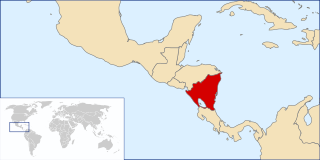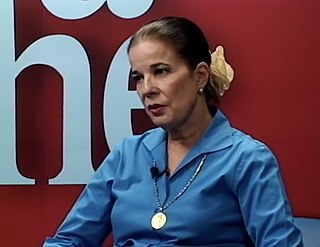Related Research Articles
Pedro Joaquín Chamorro Cardenal was a Nicaraguan journalist and publisher. He was the editor of La Prensa, the only significant opposition newspaper to the long rule of the Somoza family. He is a 1977 laureate of the Maria Moors Cabot Prize of Columbia University in New York. He married Violeta Barrios de Chamorro, who later went on to become President of Nicaragua (1990–1997). In 1978, he was shot to death, one of the precipitating events of the overthrow of the Somoza regime the following year.
La Prensa is a Nicaraguan newspaper, with offices in the capital Managua. Its current daily circulation is placed at 42,000. Founded in 1926, in 1932 it was bought by Pedro Joaquín Chamorro Zelaya, who had become editor-in-chief. He promoted the Conservative Party of Nicaragua and became a voice of opposition to Juan Bautista Sacasa, for which the paper was censored. He continued to be critical of dictator Anastasio Somoza García, who came to power in a coup d'état.

José Fruto Chamorro Pérez was a Nicaraguan politician and military scientist who served as 10th Supreme Director of Nicaragua and 1st President of Nicaragua.

Pedro Joaquín Chamorro Alfaro was the President of Nicaragua from 1 March 1875 to 1 March 1879 and a member of the conservative dominant oligarchy Chamorro family.

Diego Manuel Chamorro Bolaños was the President of Nicaragua between 1 January 1921 and 12 October 1923. He was a member of the Conservative Party of Nicaragua.
Édgar Chamorro Coronel is an ousted leader of the Nicaraguan rebel Contras who later became a critic of the rebels and their Central Intelligence Agency sponsors, even cooperating with the Sandinista government in their World Court case, Nicaragua v. United States. He is a member of the prominent Chamorro family that provided five of Nicaragua's past presidents.
Rosendo Chamorro Oreamuno was briefly President of Nicaragua in 1923. He received a doctorate from the University of Paris.

Fernando Chamorro Alfaro was a General and member of the governing junta of Nicaragua (1860–1863).
El Grupo de los Doce, or Group of Twelve, were a dozen members of the Nicaraguan establishment whose support for the Sandinista National Liberation Front (FSLN) against President Anastasio Somoza Debayle played a pivotal role in the acceptance of the Sandinistas by foreign and domestic opinion.
Emilio Á|lvarez Lejarza was a Nicaraguan government official and jurist.
The mass media in Nicaragua consist of several different types of communications media: television, radio, cinema, newspapers, magazines, and Internet-based Web sites.

The following is an alphabetical list of topics related to Nicaragua.

Xavier Chamorro Cardenal was a Nicaraguan journalist. He began his career working at his father’s newspaper, La Prensa, and in 1980 became founding editor and publisher of El Nuevo Diario, a competitor newspaper.

General elections were held in Nicaragua on 25 February 1990 to elect the President and the members of the National Assembly. The result was a victory for the National Opposition Union (UNO), whose presidential candidate Violeta Chamorro surprisingly defeated incumbent president Daniel Ortega of the Sandinista National Liberation Front (FSLN). This led to a historic peaceful and democratic transfer of power in Nicaragua.

Claudia Lucía Chamorro Barrios is a Nicaraguan writer, public health official, and former ambassador of Nicaragua to Cuba and Costa Rica. She served as a diplomat on behalf of the Sandinista government in the 1980s. She later became a critic of the FSLN. She is the author of a memoir, Tiempo de Vivir.

Juan Sebastián Chamorro García is a Nicaraguan economist, businessman and politician. He was a pre-candidate for president in the 2021 Nicaraguan general election until he was detained in a wave of arrests of opposition candidates and other civic leaders.

Cristiana Chamorro Barrios is a Nicaraguan journalist, nonprofit executive and political candidate. Vice-president of La Prensa, she was an aspiring presidential candidate in the 2021 Nicaraguan general election until the Ortega government disqualified her from running and ordered her arrest in early June 2021.
Pedro Joaquín Chamorro Barrios is a Nicaraguan journalist and politician. He began his career in journalism working at La Prensa, following the 1978 assassination of its editor, his father, Pedro Joaquín Chamorro Cardenal. Working on the side of the Contras in exile in the 1980s, he returned to the country in 1989 when his mother Violeta Barrios de Chamorro ran for president, and following her election, served as a Nicaraguan ambassador. He later became defense minister. In the 21st century, Chamorro has been a city councilor for Managua and deputy in the National Assembly, also for Managua. On 25 June 2021, he became part of a wave of arrests of opposition and civic figures in Nicaragua.

Jaime Chamorro Cardenal was a Nicaraguan newspaper editor and publisher. A civil engineer by training, journalism was the family business, as his father owned the newspaper La Prensa. Chamorro joined La Prensa in 1974, where he worked for 47 years and served as publisher for 28, from 1993 until his death in 2021.
References
- Genealogia Familia Chamorro, por El Dr. Emilio Alvarez Lejarza (1951), Talleres Tipograficos y Litograficos de la Editorial Catolica, S. A. Managua, Nic.-C. A.
- Recorrido Historico de las Principales Figuras de la Familia Chamorro, Emilio Alvarez Lejarza, Revista Conservadora del Pensamiento Centroamericano, Vol. XIX - No. 91 (Abril, 1968)
- La Prensa - September 11, 2000